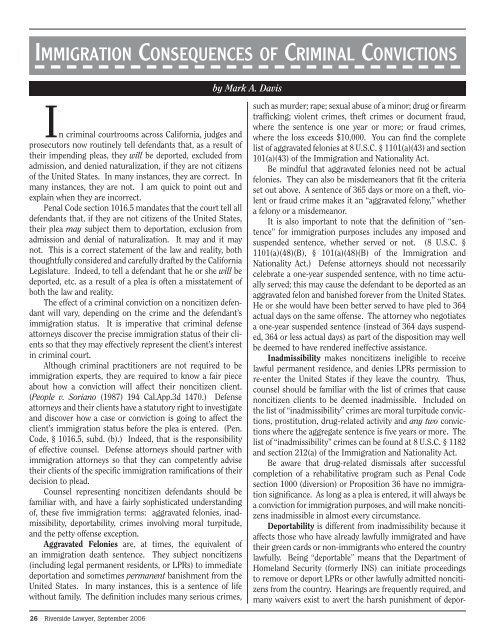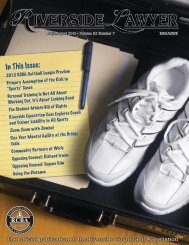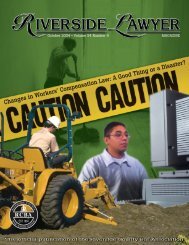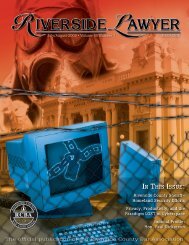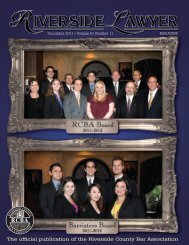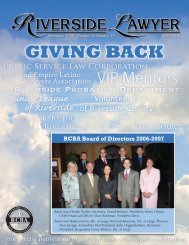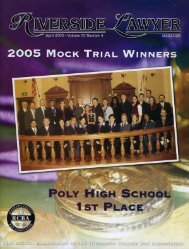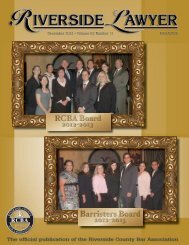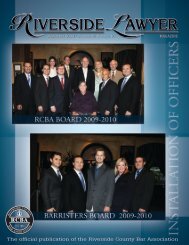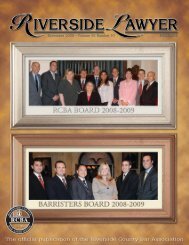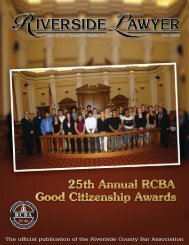THE JOHN GABBERT GALLERY - Riverside County Bar Association
THE JOHN GABBERT GALLERY - Riverside County Bar Association
THE JOHN GABBERT GALLERY - Riverside County Bar Association
Create successful ePaper yourself
Turn your PDF publications into a flip-book with our unique Google optimized e-Paper software.
Immigration Consequences of Criminal Convictions<br />
by Mark A. Davis<br />
In criminal courtrooms across California, judges and<br />
prosecutors now routinely tell defendants that, as a result of<br />
their impending pleas, they will be deported, excluded from<br />
admission, and denied naturalization, if they are not citizens<br />
of the United States. In many instances, they are correct. In<br />
many instances, they are not. I am quick to point out and<br />
explain when they are incorrect.<br />
Penal Code section 1016.5 mandates that the court tell all<br />
defendants that, if they are not citizens of the United States,<br />
their plea may subject them to deportation, exclusion from<br />
admission and denial of naturalization. It may and it may<br />
not. This is a correct statement of the law and reality, both<br />
thoughtfully considered and carefully drafted by the California<br />
Legislature. Indeed, to tell a defendant that he or she will be<br />
deported, etc. as a result of a plea is often a misstatement of<br />
both the law and reality.<br />
The effect of a criminal conviction on a noncitizen defendant<br />
will vary, depending on the crime and the defendant’s<br />
immigration status. It is imperative that criminal defense<br />
attorneys discover the precise immigration status of their clients<br />
so that they may effectively represent the client’s interest<br />
in criminal court.<br />
Although criminal practitioners are not required to be<br />
immigration experts, they are required to know a fair piece<br />
about how a conviction will affect their noncitizen client.<br />
(People v. Soriano (1987) 194 Cal.App.3d 1470.) Defense<br />
attorneys and their clients have a statutory right to investigate<br />
and discover how a case or conviction is going to affect the<br />
client’s immigration status before the plea is entered. (Pen.<br />
Code, § 1016.5, subd. (b).) Indeed, that is the responsibility<br />
of effective counsel. Defense attorneys should partner with<br />
immigration attorneys so that they can competently advise<br />
their clients of the specific immigration ramifications of their<br />
decision to plead.<br />
Counsel representing noncitizen defendants should be<br />
familiar with, and have a fairly sophisticated understanding<br />
of, these five immigration terms: aggravated felonies, inadmissibility,<br />
deportability, crimes involving moral turpitude,<br />
and the petty offense exception.<br />
Aggravated Felonies are, at times, the equivalent of<br />
an immigration death sentence. They subject noncitizens<br />
(including legal permanent residents, or LPRs) to immediate<br />
deportation and sometimes permanent banishment from the<br />
United States. In many instances, this is a sentence of life<br />
without family. The definition includes many serious crimes,<br />
such as murder; rape; sexual abuse of a minor; drug or firearm<br />
trafficking; violent crimes, theft crimes or document fraud,<br />
where the sentence is one year or more; or fraud crimes,<br />
where the loss exceeds $10,000. You can find the complete<br />
list of aggravated felonies at 8 U.S.C. § 1101(a)(43) and section<br />
101(a)(43) of the Immigration and Nationality Act.<br />
Be mindful that aggravated felonies need not be actual<br />
felonies. They can also be misdemeanors that fit the criteria<br />
set out above. A sentence of 365 days or more on a theft, violent<br />
or fraud crime makes it an “aggravated felony,” whether<br />
a felony or a misdemeanor.<br />
It is also important to note that the definition of “sentence”<br />
for immigration purposes includes any imposed and<br />
suspended sentence, whether served or not. (8 U.S.C. §<br />
1101(a)(48)(B), § 101(a)(48)(B) of the Immigration and<br />
Nationality Act.) Defense attorneys should not necessarily<br />
celebrate a one-year suspended sentence, with no time actually<br />
served; this may cause the defendant to be deported as an<br />
aggravated felon and banished forever from the United States.<br />
He or she would have been better served to have pled to 364<br />
actual days on the same offense. The attorney who negotiates<br />
a one-year suspended sentence (instead of 364 days suspended,<br />
364 or less actual days) as part of the disposition may well<br />
be deemed to have rendered ineffective assistance.<br />
Inadmissibility makes noncitizens ineligible to receive<br />
lawful permanent residence, and denies LPRs permission to<br />
re-enter the United States if they leave the country. Thus,<br />
counsel should be familiar with the list of crimes that cause<br />
noncitizen clients to be deemed inadmissible. Included on<br />
the list of “inadmissibility” crimes are moral turpitude convictions,<br />
prostitution, drug-related activity and any two convictions<br />
where the aggregate sentence is five years or more. The<br />
list of “inadmissibility” crimes can be found at 8 U.S.C. § 1182<br />
and section 212(a) of the Immigration and Nationality Act.<br />
Be aware that drug-related dismissals after successful<br />
completion of a rehabilitative program such as Penal Code<br />
section 1000 (diversion) or Proposition 36 have no immigration<br />
significance. As long as a plea is entered, it will always be<br />
a conviction for immigration purposes, and will make noncitizens<br />
inadmissible in almost every circumstance.<br />
Deportability is different from inadmissibility because it<br />
affects those who have already lawfully immigrated and have<br />
their green cards or non-immigrants who entered the country<br />
lawfully. Being “deportable” means that the Department of<br />
Homeland Security (formerly INS) can initiate proceedings<br />
to remove or deport LPRs or other lawfully admitted noncitizens<br />
from the country. Hearings are frequently required, and<br />
many waivers exist to avert the harsh punishment of depor-<br />
26 <strong>Riverside</strong> Lawyer, September 2006


